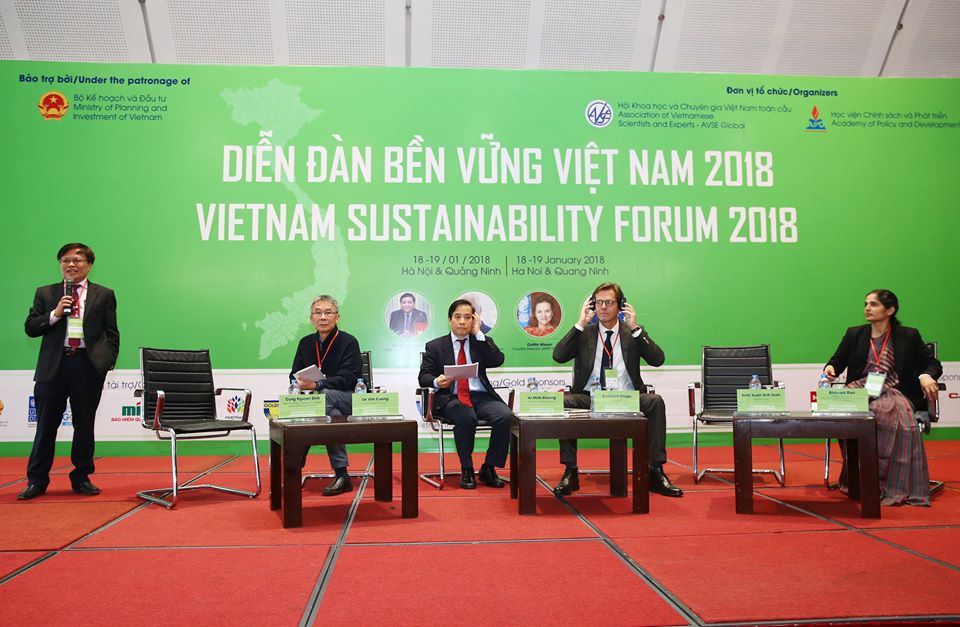Six major solutions for properous and sustainable growth
 |
| Vietnam Sustainability Forum 2018 was kicked-off this morning |
After 30 years of reforms, Vietnam has posted many remarkable economic achievements. GDP growth was 6.81 per cent in 2017, which is the highest increase over the last ten years. The growth model has shifted from mining natural resources and crude oil to processing and manufacturing industrial development and services. International organisations also recognised Vietnam’s improving business climate and competitiveness.
On the other hand, Vietnam faces many difficulties and challenges, such as low GDP per capita, low productivity, income inequality, as well as the impacts of environmental pollution and climate change on production and people’s lives. It is necessary to find new motivation to overcome the middle-income trap and the risk of economic slowdown.
Due to these challenges, Andress Schleicher, director for education and skills and special advisor on education policy to the Secretary General of the Organisation for Economic Co-operation and Development (OECD), said that education and skills play an important role in Vietnam's sustainable development, especially against the context of Industry 4.0.
Speaking at Vietnam Sustainability Forum (VSF) 2018 held on January 18, 2018, Andress Schleicher noted: “The government has a key role as platform or broker, as stimulator, incentiviser, and enabler, and it can focus resources, set a facilitative policy climate, and use accountability and reporting modifications to encourage new practices. However, education needs to better identify key agents of change and champion them to find more effective approaches for scaling and disseminating innovations. This is also about finding better ways to recognise, reward, and give exposure to success, to do whatever possible to make innovation easier and encourage new ideas.”
Caitlin Wiesen, country director of UNDP Vietnam, said that 40 per cent of the population are in low productivity agricultural jobs. There are few linkages between the foreign direct investment (FDI) sector and domestic firms. Besides, the domestic non-farm sector is still too small and lacks productivity.
Thus, in order to enhance labour productivity, creating a basis for sustainable economic development, Vietnam needs to create higher productivity jobs for all, provide better skills training for all employees, and issue strict requirements about product quality. At the same time, Vietnam needs to build solutions to support the weak because a sustainable country is a nation that leaves no one behind.
Related to the digital revolution promoting sustainable development in developing countries, PhD. Prof. Nguyen Duc Khuong, chairman of the Association of Vietnamese Scientists and Experts's (AVSE), also member of the economic advisory board for the Vietnamese prime minister, said that sustainable development is based on three pillars, including economic growth, responsible environmental management, and social inclusion.
He also proposed various key mechanisms in six areas through which digital transformation could foster sustainable development. These are decision making, sharing economies and synergies, operational excellence, learning and innovation, renewable resources and data, transparency and monitoring. These six areas constitute a comprehensive framework for the government to embrace the digital revolution and promote sustainable development.
 |
| Minister Nguyen Chi Dung |
In order to develop a prosperous economy that is environmentally sustainable and socially inclusive, Minister Dung outlined the six solutions that Vietnam has been focusing on in the coming time. First, the country is reforming its institutional and legal systems, and is issuing and amending mechanisms and policies to facilitate the operation of a market-oriented economy and promote socioeconomic development.
Second, the government does its utmost to improve its business climate, restructuring state-owned enterprises, promote the private sector, and attract foreign direct investment.
“Barriers and administrative procedures which directly affect businesses and the market are being removed in order to create equal access to capital, land, natural resources, and opportunities. The government will also promote innovation in the private sector, technical modernisation, as well as the improvement of human resources and productivity,” said Minister Nguyen Chi Dung.
Third, the national innovation system needs to focus on enterprises and research and development activities, promote creativity for all people, enterprises, and organisations.
Fourth, the promotion of growth focuses on three special administrative-economic zones with outstanding institutional and international competitiveness.
Fifth, economic development needs to go hand-in-hand with ensuring social equality and integration, promoting the privatisation of public services, bringing opportunities of development for all people.
Sixth, it is necessary to develop a sustainable environment and cope with climate change. Additionally, it is important to improve the capacity for forecasting natural disasters, monitoring climate change, increase resistance, mobilise resources for investment in projects coping with climate change and natural disaster prevention.
| Three strategic breakthroughs for socioeconomic development in 2018 The government has just proposed major measures to facilitate socioeconomic development in 2018, including the implementation of three strategic breakthroughs and facilitating the country’s progress in Industry 4.0. |
| Government’s first resolution of the year sets remarkable targets On the first day of 2018, the government issued Resolution No.01/NQ-CP on major tasks and solutions guiding the implementation of the 2018 socioeconomic development plan and the state budget estimate. |
What the stars mean:
★ Poor ★ ★ Promising ★★★ Good ★★★★ Very good ★★★★★ Exceptional
Latest News
More News
- US firms deepen energy engagement with Vietnam (February 05, 2026 | 17:23)
- Vietnam records solid FDI performance in January (February 05, 2026 | 17:11)
- Site clearance work launched for Dung Quat refinery upgrade (February 04, 2026 | 18:06)
- Masan High-Tech Materials reports profit: a view from Nui Phao mine (February 04, 2026 | 16:13)
- Hermes joins Long Thanh cargo terminal development (February 04, 2026 | 15:59)
- SCG enhances production and distribution in Vietnam (February 04, 2026 | 08:00)
- UNIVACCO strengthens Asia expansion with Vietnam facility (February 03, 2026 | 08:00)
- Cai Mep Ha Port project wins approval with $1.95bn investment (February 02, 2026 | 16:17)
- Repositioning Vietnam in Asia’s manufacturing race (February 02, 2026 | 16:00)
- Manufacturing growth remains solid in early 2026 (February 02, 2026 | 15:28)


















 Mobile Version
Mobile Version